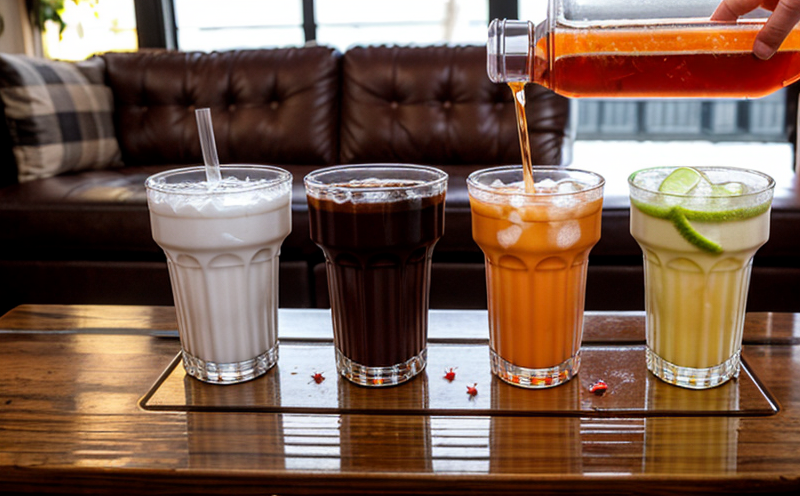ASTM E1876 Carbonation Testing in Soft Drinks
The ASTM E1876 standard is a crucial tool for ensuring carbonation stability and quality control in soft drinks. This method is essential for beverage manufacturers as it ensures consistent product performance, enhances consumer satisfaction, and aligns with regulatory standards.
Carbonation testing measures the amount of carbon dioxide present in beverages at different temperature and time intervals to ensure that the drink maintains its desired fizziness throughout shelf life. Proper carbonation not only impacts the taste but also plays a significant role in the overall quality perception by consumers. This test is particularly important for soft drinks, as maintaining optimal levels of carbonation can extend product shelf-life while enhancing consumer satisfaction.
The ASTM E1876 protocol involves several steps including sample preparation, measurement using pressure cells or gas transfer systems, and analysis at specified temperatures to simulate real-world conditions. Understanding these parameters allows manufacturers to optimize production processes for better product quality.
One of the key benefits of this testing method is its ability to identify issues early in the production process before they become costly problems later on. By identifying discrepancies between expected carbonation levels and actual results, manufacturers can make necessary adjustments promptly, thereby reducing waste and improving overall efficiency.
In summary, ASTM E1876 carbonation testing ensures that soft drinks retain their fizziness throughout storage and distribution, which is critical for maintaining product quality and consumer satisfaction. It also helps in meeting regulatory requirements and enhances brand reputation by delivering consistent products to consumers.
Benefits
The implementation of ASTM E1876 carbonation testing offers numerous advantages that contribute significantly towards improving the overall quality and consistency of soft drinks:
- Consistent Product Quality: Ensures that each batch of soft drink has consistent levels of carbonation, leading to a more uniform product.
- Enhanced Consumer Satisfaction: Maintaining proper carbonation is crucial for delivering the expected taste and experience consumers anticipate from their favorite beverage.
- Regulatory Compliance: By adhering to international standards like ASTM E1876, manufacturers ensure that their products meet legal requirements which can vary across different markets.
- Cost Efficiency: Early detection of carbonation issues through testing helps prevent costly rework or recall situations later down the line.
In addition to these benefits, regular carbonation testing allows companies to stay competitive by consistently delivering high-quality products that meet both internal and external expectations.
Why Choose This Test
- Precision: ASTM E1876 provides precise measurements of carbon dioxide content, ensuring accurate results.
- Standardization: The method is standardized globally, providing a uniform approach that can be followed worldwide.
- Consistency: Regular testing using ASTM E1876 helps maintain consistent carbonation levels across all batches of soft drink production.
- Safety: Ensuring proper carbonation prevents potential safety hazards such as overcarbonation which could lead to bottle explosions or undercarbonation resulting in poor taste.
Selecting ASTM E1876 for carbonation testing allows manufacturers to achieve these benefits, thereby enhancing the quality and safety of their products. This standard not only supports compliance with international regulations but also contributes positively towards building trust among consumers and stakeholders alike.
Customer Impact and Satisfaction
The impact of ASTM E1876 carbonation testing on customers cannot be overstated. Properly carbonated soft drinks enhance consumer satisfaction by delivering the expected taste and fizziness, which are key factors in brand loyalty. Consistent product quality, as ensured by this testing method, contributes significantly towards building a positive reputation for brands.
Customers expect consistency from their favorite beverages, and ASTM E1876 helps manufacturers meet these expectations. By ensuring that every batch of soft drink meets the required carbonation levels, companies can avoid disappointing consumers who rely on their product to provide a particular experience.
In addition to enhancing customer satisfaction, this testing method also supports brand reputation by consistently delivering high-quality products. Brands that adhere to international standards like ASTM E1876 are seen as reliable and trustworthy, which is crucial in today’s competitive market environment.
Regular carbonation testing using ASTM E1876 allows companies to maintain product quality over time, ensuring that each batch of soft drink meets the desired specifications. This commitment to maintaining consistent carbonation levels contributes positively towards building a positive brand image and fostering long-term customer relationships.





